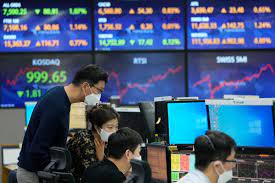Tokyo, Sept 30:Asian shares were mostly higher on Thursday after a mixed trading session on Wall Street.
Tokyo’s Nikkei 225 index was little changed after the release of disappointing factory and retail sales data. Shares fell in Hong Kong but most other regional benchmarks advanced.
Japanese investors appeared to take in stride the choice of former Foreign Minister Fumio Kishida to head the ruling Liberal Democrats and thus become the next prime minister.
China Evergrande Group’s shares fell 4.9% as reports said the company, which is struggling to whittle down its debt, was likely to miss another payment on a bond.
Evergrande’s shares had surged Wednesday after it announced it was selling a stake in Shengjing Bank to help repay a 10 billion yuan (USD 1.6 billion) its debt to the lender based in northeastern China.
Hong Kong’s Hang Seng index lost 0.8% to 24,468.38 while the Nikkei 225 in Tokyo shed 0.1% to 29,512.20.
The Shanghai Composite index gained 0.6% to 3,558.85 and Australia’s S&P/ASX 200 jumped 1.7% to 7,319.80. In Seoul, the Kospi climbed 0.5% to 3,075.76.
The yield on the 10-year Treasury, which is used to set interest rates on many kinds of loans, slipped to 1.52% from 1.53%.
On Wednesday, the S&P 500 rose 0.2% to 4,359.46 after shedding most of a 0.8% gain. The modest gain came a day after the benchmark index posted its worst drop since May. The index is on pace for its first first monthly loss since January.
The Dow Jones Industrial Average also lost momentum, but managed a 0.3% gain to 34,390.72, while the tech-heavy Nasdaq composite gave back 0.2% to 14,512.44.
The Russell 2000 index of small companies also fell, shedding 0.2% to 2,225.31.
Bond yields stabilized after surging over the past week and weighing on the market, especially technology stocks. The higher yields have forced investors to reassess whether prices have run too high for stocks, because it makes them look expensive by comparison.
The broader market has lost ground in September, leaving the S&P 500 down 3.6% for the month with one day left to go.
Investors have spent much of the month reviewing a mixed batch of economic data that showed COVID-19 and the highly contagious delta variant’s impact on consumer spending and the employment market recovery.
Investors are still closely watching the Federal Reserve to gauge how the slowdown in economic growth will impact the speed of its plan to eventually trim the bond purchases it’s been making to helped keep interest rates low.
Wall Street also has its eye on Washington, where Democrats and Republicans in Congress are wrestling over extending the nation’s debt limit. If the limit, which caps the amount of money the federal government can borrow, isn’t raised by Oct. 18, the country “would likely face a financial crisis and economic recession,” Treasury Secretary Janet Yellen told Congress on Wednesday.
Yellen’s remarks came a day after Senate Republicans blocked consideration of a bill that would have raised the debt limit.
The next few weeks will bring a fresh round of corporate earnings that will give investors a detailed look at how supply chain problems and higher costs are impacting corporate finances.
A wide range of companies have been warning investors about the impact of inflation on costs and profits. Nike, Costco and FedEx are among those that have cited materials costs, shipping delays and labor problems as concerns.
In other trading Thursday, U.S. Benchmark crude oil lost 5 cents to USD 74.78 per barrel in electronic trading on the New York Mercantile Exchange. It gave up 46 cents to USD 74.89 per barrel on Wednesday.
Brent crude oil declined 15 cents to USD 77.94 per barrel.
The U.S. Dollar slipped to 111.90 Japanese yen from 111.96 yen. The euro rose to USD 1.1608 from USD 1.1599. (AGENCIES)


